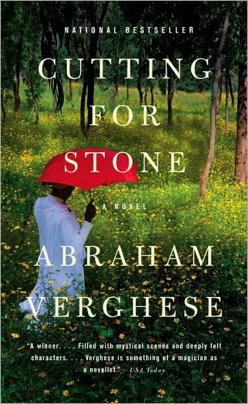Patricia Bertschy Reviews
Cutting for Stone
A novel by Abraham Verghese
Random House, 2009
Cutting for Stone is a story about love, loss, loyalty and trust. Marion and Shiva Stone are twins born under mysterious circumstances. Marion, the first-born, is the narrator searching to understand who his parents are, both the parents who raised him and those who abandoned him. As the twins grow to adulthood and become doctors, the plot takes twists and turns that are intricate and interesting.
The story is set in the 1950's, with a social backdrop of political unrest, oppression, and poverty. Hema and Ghosh, who raise the boys as their own, are doctors at "Missing" Hospital, a small clinic in North Africa, which gets its name from an Ethiopian mispronunciation of "mission."
Missing Hospital has rudimentary supplies at best and the doctors struggle to take care of the many patients who walk miles to be seen. There is only one surgeon, and when they lose him, only Hema, an obstetrician, and Ghosh, an internist, remain. A nearby military hospital takes the more serious cases, but Ghosh and Hema must learn to perform surgery out of necessity.
The characters in Cutting for Stone are richly drawn and absorbing. The major characters, especially, have integrity and honesty that drive their choices and shape their destinies. Through Verghese's masterful writing, we get to know them gradually, like very good friends. We understand them, and don't want to leave them at the end.
Verghese, a Professor and Senior Associate Chair at the Stanford University School of Medicine, describes medical procedures with meticulous, sometimes sickening detail. Operating room scenes are instructional, as though written for someone who is going to perform surgery.
Verghese brings us into the operating room with his vivid phraseology: "the visceral odor of a freshly opened abdomen." When Dr. Ghosh questions himself, "Should I have tacked the sigmoid colon to the abdominal wall to prevent it twisting again?" we understand the question.
The contrast between medicine in Africa and in the U.S. is ever-present. Not only is the equipment more modern and the staff more expert in America, there is also a different set of expectations. In Ethiopia, Dr. Stone observes, people assume that all illness is fatal; they expect death. In America, death comes as a surprise, as if we take it for granted that we are immortal.
There are several layers to the story as there are meanings to the title. As the threads of the story come together, there are some unrealistic circumstances, but Verghese uses coincidence well. The narrator tells us, "The world turns on our every action, and our every omission, whether we know it or not." To have known these characters and lived with them, we agree.

Available at
www.Amazon.com
www.randomhouse.com
www.barnesandnoble.com
Patricia Bertschy is an avid reader who lives on Cape Cod.
She was recently awarded a scholarship to attend this summer's Cape Cod Writers Center Conference, held at the Craigville Conference Center, for her nonfiction story "Discovery."
Patricia was also named one of five finalists in the Norman Mailer Cape and Islands Community College Writing Awards for a work of non-fiction titled "The Long Walk".
At a January 22nd ceremony, Pat was awarded third prize in PrimeTime Cape Cod magazine's 2010 Writing Contest for Poetry and Prose, for her short story, "The Dress."
 |
